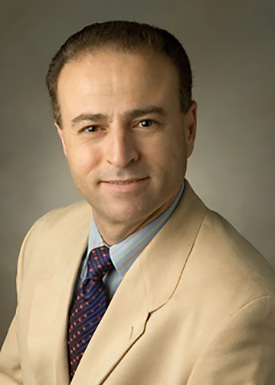Feb. 1, 2016:
 A conversation with Anas Al-Janadi, MD, associate professor of medicine at the Michigan State University College of Human Medicine, chief of the Division of Hematology/Oncology and medical director of the MSU Breslin Cancer Center, a member of the Big Ten Cancer Research Consortium.
A conversation with Anas Al-Janadi, MD, associate professor of medicine at the Michigan State University College of Human Medicine, chief of the Division of Hematology/Oncology and medical director of the MSU Breslin Cancer Center, a member of the Big Ten Cancer Research Consortium.
Q: How do you think cancer research will change in the next 10 to 20 years?
We believe strongly that collaboration is the best possible way to conduct cancer research without expanding the cost, particularly at a time when government funding for medical research has remained stagnant. But collaboration offers many other benefits besides saving money. For one, it brings more ideas and more approaches into the lab and the clinic. As a result, we expect our research will produce more meaningful results in a shorter period of time, and that will help our patients more immediately. A case in point is the current kidney cancer clinical trials initiated by Arkadiusz Dudek, MD, PhD, at the University of Illinois College of Medicine, with whom we are collaborating. That trial was up and running much sooner than studies in the past, and we expect it will be completed by December of this year. In his recent State of the Union address, President Obama called for a “moonshot” to cure cancer. With our partners in the Big Ten Cancer Research Consortium, we expect to play a major role in reaching that goal.
Q: What does translational science look like within your institution and in your collaboration with other Big Ten CRC member institutions?
The examples are many. At the College of Human Medicine and the MSU Breslin Cancer Center, our emphasis always is on conducting the kind of research that can quickly translate into new methods of detecting cancers and better therapies to fight them. My colleagues and I are increasing our translational research into breast, lung, kidney and other cancers. These include studies by Deimante Tamkus, MD, focused on translational aspects of breast tumor microenvironment, and Borys Hrinczenko, MD, who is studying a xenograft model for drug screening, biomarker development and personalized lung cancer treatment. With our Big Ten CRC partners, we also are adding clinical trials in the use of immunotherapy to fight lung, breast and other cancers.
Q: In what ways is your institution involved in expanding access to clinical trials throughout the communities you serve?
We are increasing our research on our East Lansing and Grand Rapids campuses. In Grand Rapids, we are building a new biomedical research facility, which we expect to open in 2017, allowing us to recruit more principal investigators and their staffs. This year, we plan to expand our clinical trials statewide through all seven of our regional campuses, stretching from Southeast Michigan to the Northwest Upper Peninsula.
Q: How is the Big Ten CRC unique from other research consortia in which you participate?
As a pioneer land grant institution, our mission always has been on serving the people of our state, nation and world. It is a culture we share with the other members of the Big Ten CRC, a philosophy and set of values that bring us closer in how we design and conduct our research. Our membership in the consortium also helps us develop the next generation of young investigators with mentorships by many of the top cancer researchers in the country. Without this emphasis on collaboration, rather than on competition, this would not be possible.
About the Big Ten Cancer Research Consortium: The Big Ten Cancer Research Consortium was created in 2013 to transform the conduct of cancer research through collaborative, hypothesis-driven, highly translational oncology trials that leverage the scientific and clinical expertise of Big Ten universities. The goal of the Big Ten Cancer Research Consortium is to create a unique team-research culture to drive science rapidly from ideas to new approaches to cancer treatment. Within this innovative environment, today’s research leaders collaborate with and mentor the research leaders of tomorrow with the unified goal of improving the lives of all patients with cancer.
About the Big Ten Conference: The Big Ten Conference is an association of world-class universities whose member institutions share a common mission of research, graduate, professional and undergraduate teaching and public service. Founded in 1896, the Big Ten has sustained a comprehensive set of shared practices and policies that enforce the priority of academics in the lives of students competing in intercollegiate athletics and emphasize the values of integrity, fairness and competitiveness. The broad-based programs of the 14 Big Ten institutions will provide over $200 million in direct financial support to almost 9,500 students for more than 11,000 participation opportunities on 350 teams in 42 different sports. The Big Ten sponsors 28 official conference sports, 14 for men and 14 for women, including the addition of men’s ice hockey and men’s and women’s lacrosse since 2013. For more information, visit www.bigten.org.














Subscribe to the Big Ten CRC Newsletter X
X Facebook
Facebook YouTube
YouTube